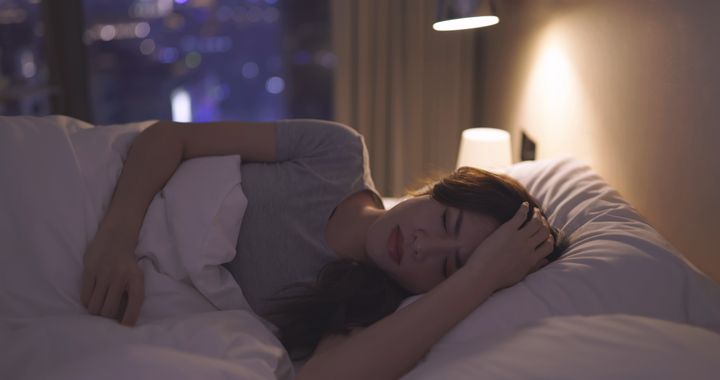🔴 Website 👉 https://u-s-news.com/
Telegram 👉 https://t.me/usnewscom_channel
Skimping on sleep is a dangerous habit that can put you at risk of high blood pressure, heart disease, dementia and more. Adults need between seven and nine hours of sleep each night. And even if you’re going to bed at a time that allows for enough sleep, it’s not necessarily easy to know whether your body is actually getting proper rest.
Doctors say one of the leading causes of poor-quality sleep is obstructive sleep apnea, a condition that affects about 25 million Americans. “Sleep apnea is a chronic sleep disorder characterized by difficulty breathing during sleep,” said Katie McCullar, a postdoctoral fellow in the neurology department at Massachusetts General Hospital.
Sleep apnea can increase your risk of certain health conditions, and can even be life-threatening if left untreated. Because of this, experts stress that two of the main signs of sleep apnea ― which occur during sleep ― are not something they would ignore. Here’s what they are:
Snoring.
A common nighttime symptom of sleep apnea is snoring, said Dr. Robson Capasso, chief of sleep surgery at the Stanford University School of Medicine in California. You may not realize you’re snoring, but it’s often something a partner brings up, he noted.
This kind of snoring is generally noisy, and you may be woken up by the sound of a loud snort, according to the Mayo Clinic.
On the other hand, there are instances where people snore even though they don’t have sleep apnea. “They just have what we call primary snoring, so they just make the noise because the tissues in the back of the throat are fluttering,” Capasso said.
Snoring can also be the result of sleeping on your back or sleeping in a dry room, McCullar said. So don’t panic if you snore, but also don’t discount the possibility that it’s a symptom of something serious. The only way to determine whether you’re snoring because of apnea or because of some other reason is by visiting a doctor and getting a sleep test.
Strange breathing patterns.
Snoring in itself is a breathing issue, but for people with sleep apnea, other breathing problems can arise too.
“Interestingly, it is not only snoring that indicates issues with breathing during sleep but also sporadic periods of silence,” McCullar explained. “Someone suffering from sleep apnea may experience segments of time where they are not breathing at all, so they are unable to snore while their airway is closed. They will often startle awake after these moments of quiet due to the blood oxygen levels dropping below a certain level, causing them to wake from sleep.”
People may also experience something called hypopnea, according to Capasso, which is when you don’t stop breathing but you have decreased air flow. Often it sounds like “a series of shallow breaths,” he said.
Again, these aren’t things you’re likely to notice on your own (although waking up multiple times in the night can be a sign). So it can be hard to pin down what may be happening.
“If there’s a bed partner, typically, what we hear most often is that the bed partner will report either it’s very difficult to hear that they’re breathing, or they’re very certain that the patient stops breathing altogether,” said Dr. Akinbolaji Akingbola, an assistant professor of medicine at the University of Minnesota Medical School.
If you have a bed partner, check in with them to see if they ever notice any stopped breathing or choking sounds. If you don’t have a bed partner but find yourself waking up a lot at night and dealing with daytime sleepiness, take note, as these can be other signs of the condition.
PonyWang via Getty Images
If you have sleep apnea symptoms, you should see a specialist.
“Sleep apnea can lead to devastating health outcomes, including heart disease, strokes and diabetes, when left untreated,” McCullar said. “If you are having issues with persistent snoring or frequent feelings of drowsy during the day, it may be due to a sleep issue, and you should seek advice from a health care provider.”
From there, you may be prescribed a sleep test to see exactly what’s going on. There are medical treatments (like a CPAP machine, which helps regulate your nighttime breathing) and surgeries that can be prescribed, in addition to lifestyle changes, Capasso said.
GLP-1s ― that is, medications like Wegovy and Ozempic ― have been shown to improve sleep apnea, as has general weight loss, Capasso said. Avoiding alcohol before bed is also beneficial.
Snoring can be harmless, and it isn’t always a sign of something bigger. But it also shouldn’t be ignored.
“If someone is a chronic snorer and there is any concern, I think just a routine evaluation with your primary care is appropriate,” Akingbola said. “I don’t think there’s necessarily a cause for great alarm, but [it’s worth] just at some point reaching out to your primary care physician to see if there’s something that should be evaluated further.”
Support Free Journalism
Already contributed? Log in to hide these messages.

